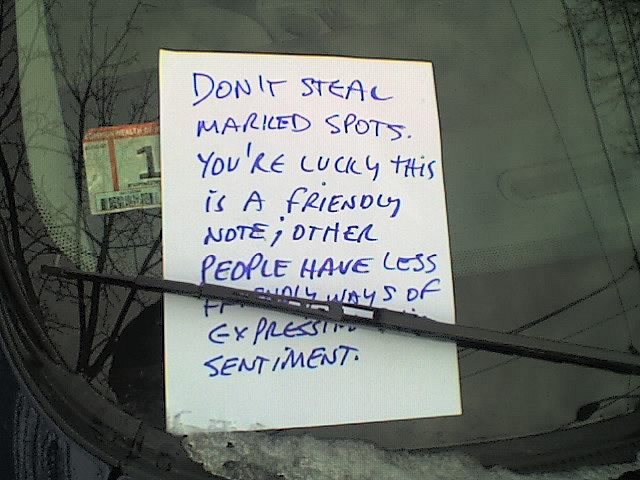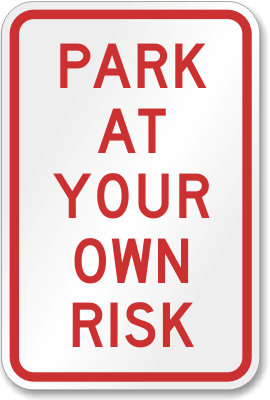Do we really need apartment parking spaces?
Some US cities may start building residential complexes with fewer apartment parking spaces or none at all. OPB reports that in the last couple of years in Portland, of 40 proposed apartment building projects, “25 offer no parking.”
In Boston, architect Sebastian Mariscal’s market research indicated that 45 percent of the renters in five census tracts surrounding Allston don’t have cars. These are the people he “had in mind when he proposed a $10.6 million apartment complex in Allston with 44 units — and just six parking spaces, all for Zipcars.
Tenants would agree in their leases not to own vehicles; in return, each unit would get two bicycle spaces and extra storage for the bulky items — like ski gear in summer, beach chairs in winter — that clutter up the average Boston apartment.” (Report: The Boston Globe)

A not-so-friendly note by a Boston resident to another after shoveling an on-street parking spot out of a snowstorm. (Image by PJMorse used under a Creative Commons License)
Although Mariscal’s project seems like a win-win (it falls in line with the city’s environmental priorities and doesn’t add to traffic), it does face one challenge: 1991 zoning rules that aim to keep new properties from overburdening the limited supply of street parking. “Emotions about street parking run deep in Boston. That much is evident in the lawn furniture and sawhorses that drivers use to reserve publicly-owned spaces after digging their cars out of the snow.”
Neighbors fear that tenants opting out of apartment parking spaces would increase pressure on street parking. Mariscal has compromised by increasing the number of parking spaces to 35.
The project furthers an emerging vision of Boston, “as a dense, growing city where car-free living is a convenience, not a last resort, and where new approaches to urban planning can flourish.” The city has witnessed a sharp increase in population. Boston added new residents far more rapidly than Massachusetts as a whole in 2000-10, especially in already jam-packed neighborhoods, including the Allston-Brighton area. With approximately 17,200 people per square mile, the Allston-Brighton area is much denser than Boston as a whole.
One of the reasons for the density in Allston is its lower housing rent, which would go up if traditional parking standards continued. However, the new parking-free units could cause even more congestion on the streets. “The side streets closest to Mariscal’s project don’t require an Allston-Brighton parking sticker, cabs and commercial vehicles from elsewhere park in the neighborhood. New units without parking, critics fear, would only add to the crunch.”
One way to relieve the pressure on street parking is to require resident stickers for overnight parking on streets surrounding the complex. The idea has had a lukewarm reception in the neighborhood.
Perhaps the tepid reaction of residents is due to the fact that some of them are students who don’t wish to register their cars in Boston. This could be for tax or insurance reasons. It would be a pity if this farseeing scheme fell through for lack of support from the very residents who stand to most benefit from it.
Related Posts
Category: No Parking, Regulations






















